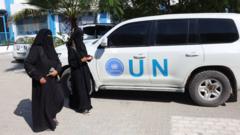In war-torn Gaza, the humanitarian crisis is deepening, with residents bracing for a potential escalation of suffering due to Israel's recent legislative moves against the United Nations Relief and Works Agency (UNRWA). Yasmine el-Ashry, a mother living in Khan Younis, expressed her despair: “UNRWA means everything to us. It is our life, our food, our drink and our medical care. Without it, my son’s health is in jeopardy.”
The ban targets UNRWA's operations, accused by some Israeli officials of harboring ties to Hamas, leading to fears of a systematic undermining of Palestinian aid. Saeed Awida, a registered refugee, characterized the move as yet another form of warfare against the Palestinian people. Despite considerable international backlash, support for the ban within the Israeli parliament remains robust, as lawmakers fear that the agency's involvement could bolster terrorist activities.
UNRWA has categorically denied these accusations, defending its neutral position in the ongoing conflict. Deputy director Sam Rose warned that if the ban is enforced in the scheduled three months, it could severely disrupt the agency’s operations in Gaza, complicating logistics for supplies and restricting safe movement in and out of conflict zones. The protected status of UNRWA facilities housing displaced individuals would also be compromised, exacerbating the vulnerability of those relying on these essential services.
Israeli sources have warned about the ramifications of this decision, suggesting it could lead to serious breaches of international humanitarian law. Yet, domestic political motivations have taken precedence over these cautions. Established in 1949, UNRWA was designed to support Palestinian refugees displaced during the first Arab-Israeli war, a mission that has expanded to encompass over six million people across Gaza, the West Bank, Lebanon, Jordan, and Syria.
Accusations have long been directed at UNRWA regarding the educational content in its schools, in light of recent escalations in violence. Reports highlighted that UNRWA employed a Hamas commander involved in a deadly attack, leading to an ongoing investigation into the agency's possible complicity.
While Israel argues that UNRWA perpetuates the Palestinian refugee situation, UN officials insist that a comprehensive political agreement is the pathway to resolution. However, in a region where many residents identify as refugees, Mohammed Salman from Deir al-Balah warned, “The word ‘refugee’ will disappear. They do not want the word refugee.” With Gaza’s 2.3 million residents on edge, the fate of UNRWA hangs in the balance, as does the immediate future of humanitarian assistance in the region.



















